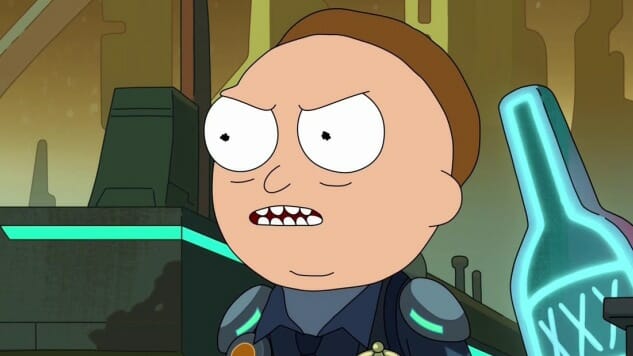Class Struggle Gets A Bold, Dark Rick and Morty Treatment
Episode 3.07: “The Ricklantis Mixup”

Just when I was starting to get a little fatigued by Rick and Morty, Justin Roiland and Dan Harmon have blown my mind anew.
At this point, the motivations of and dynamic between Rick C-137 and his Morty have been thoroughly explored—which is why Season 3’s extended soul-bearing monologues have been a detriment to the series. The episodes have largely been hilarious, but from a continuity and character-based standpoint, the development of Morty’s morals (or lack thereof) has been the only major reason to keep watching. Fortunately, there’s a Rick and Morty for every conceivable dimension, and with the show in need of a second wind, the remnants of the Citadel provide a relationship dynamic that’s entirely familiar, entirely foreign, and entirely rejuvenating. The Rick and Morty we know exit; Joe Walsh’s voice enters; suddenly, we’re in a world of class struggle, scathing political satire and ‘80s-style grit. “The Ricklantis Mixup” is like no other Rick and Morty episode that’s ever aired—it’s more like a peak-level episode of an HBO prestige drama with a strong lean into the absurd—and that’s an amazing thing.
Rick and Morty hasn’t been afraid to toss in social commentary in the past, but “The Ricklantis Mixup” is, by far, the most overtly political the series has ever been. At Comic-Con, Roiland, Harmon and Ryan Ridley (who co-wrote this episode with Dan Guterman) told me the 2016 presidential campaign constituted the vast majority of their cultural intake as they were writing Season 3, and it shows here. First and foremost, there’s the election for the Citadel’s newly democratic leadership, which is a complete subversion of America’s reality: the existential threat to Rick-society isn’t any one of the Rick candidates that acts like a buffoon on the debate stage, but rather the well-spoken Morty who runs on a legitimate reform platform and turns out to be a familiar, very sinister face. (More on that later.) More broadly, though, the societal hierarchy of the Citadel bears some dark connections to our own world and speaks forcefully and jarringly against not just racism, but also capitalism. The former is to be expected—again, attentive viewers know the Rick-Morty dynamic cold by now, and it’s no real surprise that a Mortytown slum exists. The police procedural satire nonetheless hits hard, particular Policeman Rick’s observation that it’s the “same old story, Ricks killing Mortys.” What’s more remarkable is the classism within the Rick ranks, especially given our knowledge that (nearly) every Rick is brilliant. Seeing a character that’s been described as a “super fucked-up god” reduced to assembly line work suggests two things: late capitalism is an absolute drag, and Rick C-137 is indeed the Rick-est Rick for staying out of that hell.
-

-

-

-

-

-

-

-

-

-

-

-

-

-

-

-

-

-

-

-

-

-

-

-

-

-

-

-

-

-

-

-

-

-

-

-

-

-

-

-








































